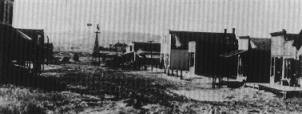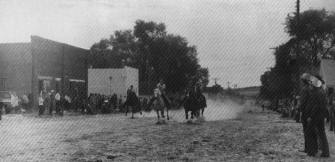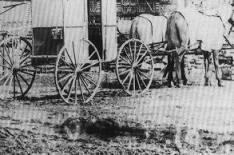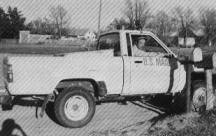
|
Visions of a great future for southwest Nebraska was foremost in the thoughts of Carroll Hawkins, a Massachusetts realtor, when he invited his friend, Doctor Tomkins, a wealthy Englishman, to come out west to see this promising town site near Medicine Creek. It was located on the railroad, midway between Holdrege and Sterling, Colorado. Together they began soliciting funds to build the town of "Wellfleet" named after Wellfleet, Massachusetts, near Plymouth Rock. The name is a corruption of "whale fleet" and in contrast to its namesake, this landlocked village was settled in a sea of grass abounding with prairie chickens and grouse.
The planned Medicine Creek dam was to be 500 feet long and 30 feet high so as to form a lake four miles long. The hydraulic power was to furnish energy for mills, factories, and a beet sugar refinery to be built as soon as beets could be grown in sufficient quantity. The post office was established in 1887 and a depot and stockyards in 1888. "The Wellfleet Standard," a newspaper published by Holton and Badford, reported in the December 26, 1889, issue that: "The improvement company is building a two story hotel costing $10,000 to be the best hotel on the branch line. The company also has donated a block for the school." A list of other businesses and owners were given that included the usual services, plus the HERO Cane Mill producing over 1,400 gallons of sorghum.
Suddenly, the boom was over. Construction of the dam had just started but the project was never finished. The promised sugar refinery was never built. A prolonged dry spell in the early nineties was said to be the reason the promoters gave up, finding that beets could not be raised without irrigation. Funds ran short and in the "money panic" that followed, discouraged promoters returned East. A number of buildings were moved to North Platte and the town dropped to a population of less than 200, content with ranching and farming as the main resources. The people that remained, however, did not give up. The first bank was organized in 1908 by the Ralston family from Farnam. A dam was finally built in 1932 after the Wellfleet Lake Company was formed, resulting in a two-mile-long lake for flood control and recreation. The population dwindled during the dust bowl days of the 1930s and World War II when residents left for more lucrative jobs. Other businesses closed after the highway connecting McCook and North Platte was paved through Wellfleet in 1955, making shopping and entertainment in the bigger towns more accessible. Wellfleet's population is 83 according to the 1980 census, but we still have a cafe, post office, machine shop, Methodist and Catholic churches, and the railroad.
By Madeline Mousel Coder, Wellfleet, NE, 69170 ADDITIONAL MATERIAL: The Wellfleet Standard, December 26, 1889; Lincoln County Tribune, various issues; The Wellfleet scrap book and early settlers, kept by Madeline Coder |
| Copyright NEGenWeb |
 WELLFLEET --
LINCOLN COUNTY
WELLFLEET --
LINCOLN COUNTY An improvement
company was formed that included English, Canadian,
and American gentlemen for the purpose of building
factories and mills on Medicine Creek, over which a
dam was to be constructed. The railroad came through
Lincoln County in 1886, with the town site chosen and
platted the following year. The company's property
consisted of 800 town lots on 200 acres, priced from
$100. Business lots were $400. Farmland could be
bought for $5 to $10 per acre.
An improvement
company was formed that included English, Canadian,
and American gentlemen for the purpose of building
factories and mills on Medicine Creek, over which a
dam was to be constructed. The railroad came through
Lincoln County in 1886, with the town site chosen and
platted the following year. The company's property
consisted of 800 town lots on 200 acres, priced from
$100. Business lots were $400. Farmland could be
bought for $5 to $10 per acre. The improvement
company built many fine businesses and residences and
soon the village population grew to 400. The first
priority of settlers in the area was to establish
homes for their families. The dwellings were of sod or
logs, or in some cases dug-outs. Next came schools,
the first built in 1890. Church services were held in
homes or the schoolhouse until after 1900.
The improvement
company built many fine businesses and residences and
soon the village population grew to 400. The first
priority of settlers in the area was to establish
homes for their families. The dwellings were of sod or
logs, or in some cases dug-outs. Next came schools,
the first built in 1890. Church services were held in
homes or the schoolhouse until after 1900. The
community focus is on the annual Fall Festival held
the second Saturday in September. The village
centennial sponsored by the Community Club was
celebrated September 13-14, 1987, in conjunction with
the festival and drew about 1,500 people. Horse races
through main street are a crowd pleaser as well as the
free beef barbecue, parade, rodeo, and activities for
all ages. It emulates a huge family reunion, with
people coming from many miles to see home-town friends
and to reminisce about "the good ol' days."
The
community focus is on the annual Fall Festival held
the second Saturday in September. The village
centennial sponsored by the Community Club was
celebrated September 13-14, 1987, in conjunction with
the festival and drew about 1,500 people. Horse races
through main street are a crowd pleaser as well as the
free beef barbecue, parade, rodeo, and activities for
all ages. It emulates a huge family reunion, with
people coming from many miles to see home-town friends
and to reminisce about "the good ol' days."